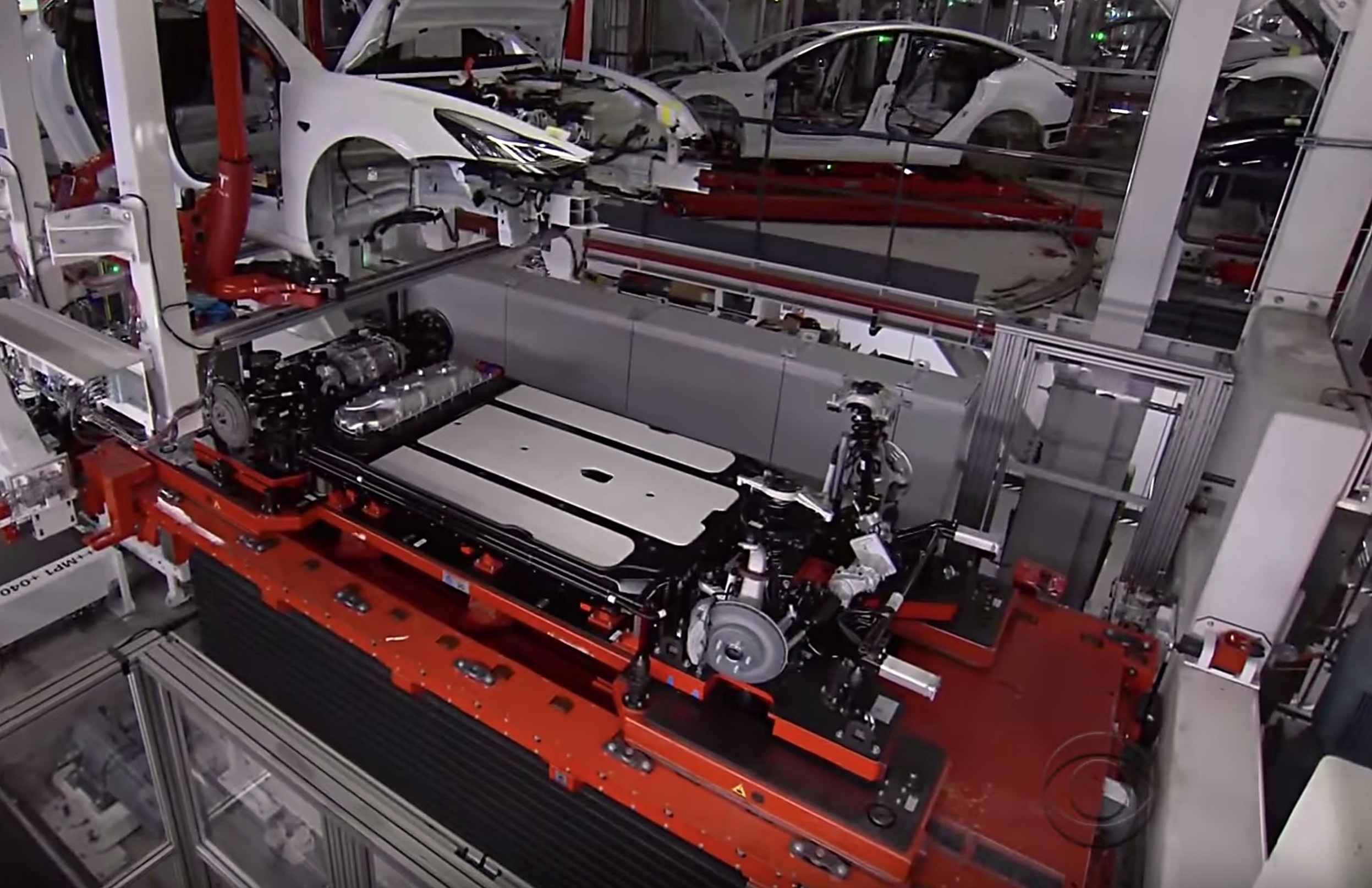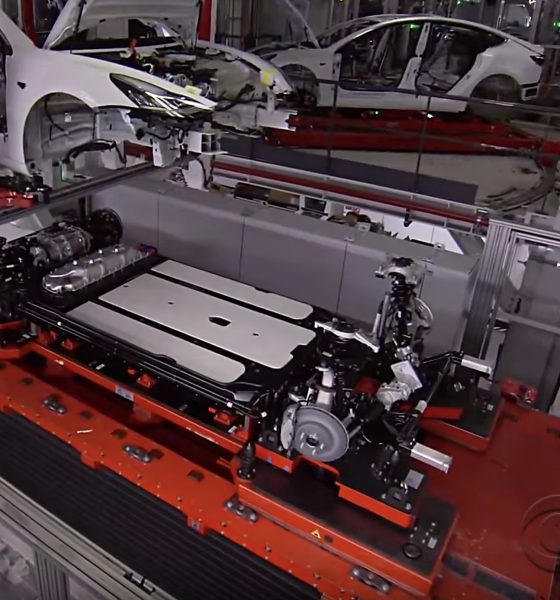

Investor's Corner
German teardown firm gives insight on Tesla Model 3 materials cost and battery composition
A German teardown company has stated that Tesla could make a profit with the Model 3. Speaking with German news agency WirtschaftsWoche, an engineer from the teardown firm stated that after analyzing and studying the vehicle, they concluded that the materials used in the Model 3 cost around $18,000 per vehicle.
The Model 3 has a base price of $35,000 for the standard range, RWD version. Currently, the premium variant of the compact electric car, the Model 3 Performance, is offered at $78,000 with all options except Autopilot. In a statement to WirtschaftsWoche, the engineer from the teardown firm stated that the Model 3 could ultimately contribute positively to Tesla’s earnings.
“If Tesla manages to build the planned 10,000 pieces a week, the Model 3 will deliver a significant positive contribution to earnings,” the engineer said.
Also notable were the conclusions of the German company about the Model 3’s battery pack. Laboratory results shared with WirtschaftsWoche noted that Tesla’s 2170 cells for the Model 3 consisted of 2.8% cobalt, 65% less than the industry average of 8%. Sven Bauer, Managing Director of Batterien-Montage-Zentrum (BMZ), one of Germany’s largest independent battery producers, stated that Tesla’s reduction in cobalt use can give the company a competitive advantage.
“That would be a significant competitive advantage for Tesla. Cobalt is currently very difficult to get on the world market,” Bauer said.
Tesla’s progress in its battery tech were highlighted in a recent report from advisory firm Benchmark Mineral Intelligence. According to BMI, Tesla has used less cobalt in its batteries since the days of the original Roadster and the Model S. With the Model S, for example, Tesla used up 11 kg of cobalt per car. Tesla is using 4.5 kg of cobalt for the Model 3, a 60% reduction.
Tesla’s improvements showcased in the Model 3’s 2170 battery cells were discussed during the company’s Q1 2018 Update Letter. According to the letter, the cobalt content of the company’s Nickel-Cobalt-Aluminum cathode chemistry is “already lower than next-generation cathodes that will be made by other cell producers with a Nickel-Manganese-Cobalt ratio of 8:1:1.” Such a ratio has not been attained by any competitor in the market so far.

The evolution of Tesla’s cobalt use over time. [Credit: Benchmark Mineral Intelligence]
The observations of the German firms about Tesla’s battery tech in the Model 3 echo the findings of Detroit veteran Sandy Munro, whose company, Munro & Associates, is also in the process of tearing down and analyzing the compact electric car. In a recent episode of Autoline After Hours on YouTube, Munro stated that the Model 3’s battery is the best in the industry today. Munro was particularly impressed with the .2-milliamp differential between the Model 3’s battery modules, stating that “nobody (in the industry) can balance batteries that close.”
Back in January, photographs emerged in the Tesla community showing the Model 3 being air-freighted to Germany. References to Stuttgart, which is where Porsche and Mercedes-Benz are based, were visible in the pictures. The German companies reportedly paid up to $230,000 for every Model 3 that they acquired.
Confirmation that German companies were analyzing the Tesla Model 3 came in February, when Georg Kacher, a journalist for German news agency Süddeutsche Zeitung, published an article stating that a “major German car company” was able to acquire a Model 3 for testing and analysis. According to Kacher’s report, the German company was surprised and impressed by the Model 3’s minimalistic design, especially in the vehicle’s interior, which was dubbed as “reminiscent of a completely cleared, black-washed Bauhaus living room.”

Elon Musk
SpaceX IPO could push Elon Musk’s net worth past $1 trillion: Polymarket
The estimates were shared by the official Polymarket Money account on social media platform X.

Recent projections have outlined how a potential $1.75 trillion SpaceX IPO could generate historic returns for early investors. The projections suggest the offering would not only become the largest IPO in history but could also result in unprecedented windfalls for some of the company’s key investors.
The estimates were shared by the official Polymarket Money account on social media platform X.
As noted in a Polymarket Money analysis, Elon Musk invested $100 million into SpaceX in 2002 and currently owns approximately 42% of the company. At a $1.75 trillion valuation following SpaceX’s potential $1.75 trillion IPO, that stake would be worth roughly $735 billion.
Such a figure would dramatically expand Musk’s net worth. When combined with his holdings in Tesla Inc. and other ventures, a public debut at that level could position him as the world’s first trillionaire, depending on market conditions at the time of listing.
The Bloomberg Billionaires Index currently lists Elon Musk with a net worth of $666 billion, though a notable portion of this is tied to his TSLA stock. Tesla currently holds a market cap of $1.51 trillion, and Elon Musk’s currently holds about 13% to 15% of the company’s outstanding common stock.
Founders Fund, co-founded by Peter Thiel, invested $20 million in SpaceX in 2008. Polymarket Money estimates the firm owns between 1.5% and 3% of the private space company. At a $1.75 trillion valuation, that range would translate to approximately $26.25 billion to $52.5 billion in value.
That return would represent one of the most significant venture capital outcomes in modern Silicon Valley history, with a growth of 131,150% to 262,400%.
Alphabet Inc., Google’s parent company, invested $900 million into SpaceX in 2015 and is estimated to hold between 6% and 7% of the private space firm. At the projected IPO valuation, that stake could be worth between $105 billion and $122.5 billion. That’s a growth of 11,566% to 14,455%.
Other major backers highlighted in the post include Fidelity Investments, Baillie Gifford, Valor Equity Partners, Bank of America, and Andreessen Horowitz, each potentially sitting on multibillion-dollar gains.
Elon Musk
Elon Musk hints Tesla investors will be rewarded heavily
“Hold onto your Tesla stock. It’s going to be worth a lot, I think. That’s my bet,” Musk said.

Elon Musk recently hinted that he believes Tesla investors will be rewarded heavily if they continue to hold onto their shares, and he reiterated that in a new interview that the company released on its social accounts this week.
Musk is one of the most successful CEOs in the modern era and has mammothed competitors on the Forbes Net Worth List over the past year as his holdings in his various companies have continued to swell.
Tesla investors, especially those who have been holding shares for several years, have also felt substantial gains in their portfolios. Over the past five years, the stock is up over 78 percent. Since February 2019, nearly seven years ago to the day, the stock is up over 1,800 percent.
Musk said in the interview:
“Hold onto your Tesla stock. It’s going to be worth a lot, I think. That’s my bet.”
Elon Musk in new interview: “Hold on to your $TSLA stock. It’s going to be worth a lot, I think. That’s my bet.” pic.twitter.com/cucirBuhq0
— Sawyer Merritt (@SawyerMerritt) February 26, 2026
It’s no secret Musk has been extremely bullish on his own companies, but Tesla in particular, because it is publicly traded.
However, the company has so many amazing projects that have an opportunity to revolutionize their respective industries. There is certainly a path to major growth on Wall Street for Tesla through its various future projects, including Optimus, Cybercab, Semi, and Unsupervised FSD.
- Optimus (Tesla’s humanoid robot): Musk has discussed its potential for tasks like childcare, walking dogs, or assisting elderly parents, positioning it as a massive long-term driver of company value.
- Cybercab (Tesla’s robotaxi/autonomous ride-hailing vehicle): a fully autonomous vehicle geared specifically for Tesla’s ride-sharing ambitions.
- Semi (Tesla’s electric truck, with mentions of expansion, like in Europe): brings Tesla into the commercial logistics sector.
- Unsupervised FSD (Full Self-Driving software achieving full autonomy without human supervision): turns every Tesla owner’s vehicle into a fully-autonomous vehicle upon release
These projects specifically are some of the highest-growth pillars Tesla has ever attempted to develop, especially in Musk’s eyes, as he has said Optimus will be the best-selling product of all-time.
Many analysts agree, but the bullish ones, like Cathie Wood of ARK Invest, are perhaps the one who believes Tesla has incredible potential on Wall Street, predicting a $2,600 price target for 2030, but this is not even including Optimus.
She told Bloomberg last March that she believes that the project will present a potential additive if Tesla can scale faster than anticipated.
Elon Musk
Tesla stock gets latest synopsis from Jim Cramer: ‘It’s actually a robotics company’
“Turns out it’s actually a robotics and Cybercab company, and I want to buy, buy, buy. Yes, Tesla’s the paper that turned into scissors in one session,” Cramer said.

Tesla stock (NASDAQ: TSLA) got its latest synopsis from Wall Street analyst Jim Cramer, who finally realized something that many fans of the company have known all along: it’s not a car company. Instead, it’s a robotics company.
In a recent note that was released after Tesla reported Earnings in late January, Cramer seemed to recognize that the underwhelming financials and overall performance of the automotive division were not representative of the current state of affairs.
Instead, we’re seeing a company transition itself away from its early identity, essentially evolving like a caterpillar into a butterfly.
The narrative of the Earnings Call was simple: We’re not a car company, at least not from a birds-eye view. We’re an AI and Robotics company, and we are transitioning to this quicker than most people realize.
Tesla stock gets another analysis from Jim Cramer, and investors will like it
Tesla’s Q4 Earnings Call featured plenty of analysis from CEO Elon Musk and others, and some of the more minor details of the call were even indicative of a company that is moving toward AI instead of its cars. For example, the Model S and Model X will be no more after Q2, as Musk said that they serve relatively no purpose for the future.
Instead, Tesla is shifting its focus to the vehicles catered for autonomy and its Robotaxi and self-driving efforts.
Cramer recognizes this:
“…we got results from Tesla, which actually beat numbers, but nobody cares about the numbers here, as electric vehicles are the past. And according to CEO Elon Musk, the future of this company comes down to Cybercabs and humanoid robots. Stock fell more than 3% the next day. That may be because their capital expenditures budget was higher than expected, or maybe people wanted more details from the new businesses. At this point, I think Musk acolytes might be more excited about SpaceX, which is planning to come public later this year.”
He continued, highlighting the company’s true transition away from vehicles to its Cybercab, Optimus, and AI ambitions:
“I know it’s hard to believe how quickly this market can change its attitude. Last night, I heard a disastrous car company speak. Turns out it’s actually a robotics and Cybercab company, and I want to buy, buy, buy. Yes, Tesla’s the paper that turned into scissors in one session. I didn’t like it as a car company. Boy, I love it as a Cybercab and humanoid robot juggernaut. Call me a buyer and give me five robots while I’m at it.”
Cramer’s narrative seems to fit that of the most bullish Tesla investors. Anyone who is labeled a “permabull” has been echoing a similar sentiment over the past several years: Tesla is not a car company any longer.
Instead, the true focus is on the future and the potential that AI and Robotics bring to the company. It is truly difficult to put Tesla shares in the same group as companies like Ford, General Motors, and others.
Tesla shares are down less than half a percent at the time of publishing, trading at $423.69.








